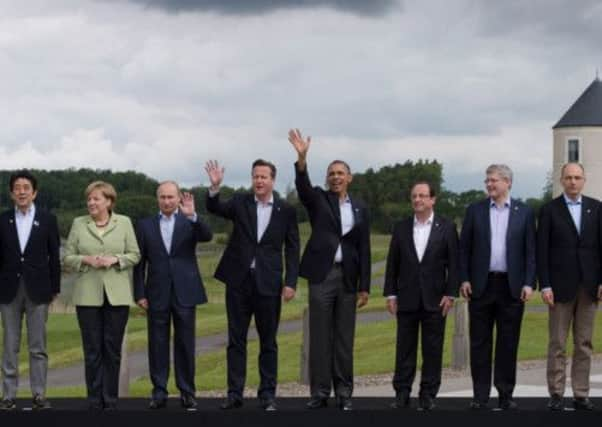G8 leaders thrash out deal to fight ‘scourge’ of tax evasion


Pledging to deliver “proper tax justice,” David Cameron said the agreement secured at the G8 summit had the potential to “rewrite the rules” on tax and transparency.
The Lough Erne Declaration –signed by the UK, US, Germany, France, Italy, Canada, Japan and Russia – promises to “fight the scourge of tax evasion” by ensuring automatic exchange of tax information and forcing companies to reveal the identities of their ultimate owners.
Advertisement
Hide AdAdvertisement
Hide AdTo tackle corruption linked to the trade in resources like oil, gas and minerals in the developing world, extractive industries and governments should publish details of what money changes hands, the agreement said.
Development charities and anti-poverty campaigners welcomed the action to open up tax havens and enforce openness on extractive industry contracts, but said the agreement did not go far enough for poor countries to reap the full benefits.
It came as Number 10 tax adviser Paul Collier warned African countries are losing twice as much in avoided tax as they are getting in aid from the West, and said company directors had a “duty” to ensure their firms paid their share of tax.
Speaking at a press conference at the conclusion of the summit in Lough Erne, Northern Ireland, Mr Cameron said it would reap benefits for countries across the world.
Advertisement
Hide AdAdvertisement
Hide AdNew mechanisms to ensure multinational companies pay taxes in the countries where they earn their profits will allow the authorities to “track and expose those who aren’t paying their fair share” and ensure “we get proper tax payment and proper tax justice in our world”, he said.
But the 10-point document falls short of the demands of anti-poverty campaigners, who want the developing world included in the new arrangements from the start and have called for tax information to be made available to all on public registers.
The declaration says only that developing countries “should have the information and capacity to collect the taxes owed them”, rather than guaranteeing them automatic access to the information. And it states “tax collectors and law enforcers” should have access to information about the ultimate owners of companies, leaving it to individual G8 countries to decide whether to make the information public as campaigners are demanding.
The White House said it would leave the decision to individual US states, while Chancellor George Osborne said the UK was “open” to the idea of public registers and is consulting on the issue.
Advertisement
Hide AdAdvertisement
Hide AdMeanwhile, Germany and Russia refused to join the other G8 nations in agreeing to publish their own action plans to ensure openness on so-called “beneficial ownership”.
Sally Copley, of anti-poverty campaign Enough Food For Everyone If said the tax deal left “major unfinished business”.
“Although the G8 has set out the right ambition on information exchange, poor countries battling hunger can’t afford to wait to be included,” she added.
Adrian Lovett, Europe executive director at the One campaign, said: “David Cameron and Francois Hollande must now lead the fight in Europe, driving efforts to get EU members to agree to make information about who really owns and controls companies public.
Advertisement
Hide AdAdvertisement
Hide Ad“If African countries are to retain and invest their resources, rather than see them siphoned away by corrupt politicians and irresponsible businesses, this is what is needed. Nothing else will do.”
Mr Cameron made the “three Ts” of trade, tax and transparency his key priorities for the summit. The first day saw the launch of talks to break down trade barriers between the EU and the US in a deal that could be worth £10bn to the UK economy.
Yesterday, the leaders also papered over their differences on Syria to agree a joint position that could pave the way for fresh peace talks in Geneva. But after resistance from Russia, it makes no reference to the future of President Bashar Assad, saying a transitional government must be formed “by mutual consent” between the different sides of Syrian society.
It also makes clear that Syria’s military and security forces will be allowed to remain intact following a transition of power. Almost $1.5bn is to be made available for humanitarian operations in Syria and its neighbours.